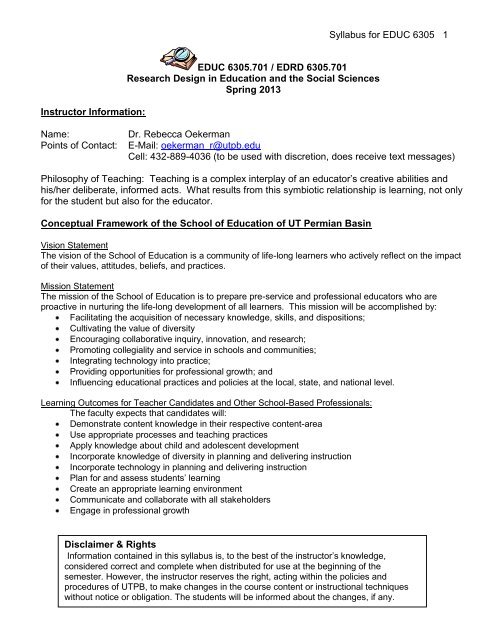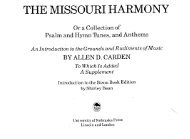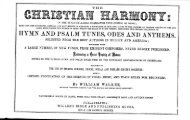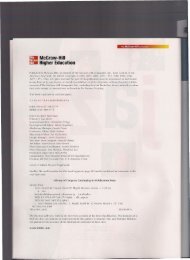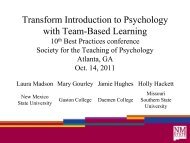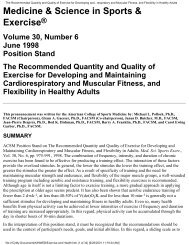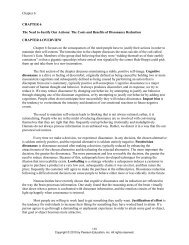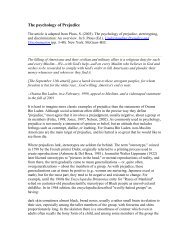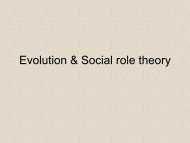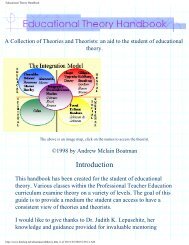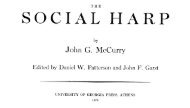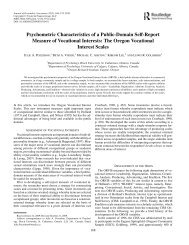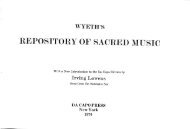Syllabus - The University of Texas of the Permian Basin
Syllabus - The University of Texas of the Permian Basin
Syllabus - The University of Texas of the Permian Basin
Create successful ePaper yourself
Turn your PDF publications into a flip-book with our unique Google optimized e-Paper software.
Instructor Information:<br />
EDUC 6305.701 / EDRD 6305.701<br />
Research Design in Education and <strong>the</strong> Social Sciences<br />
Spring 2013<br />
<strong>Syllabus</strong> for EDUC 6305 1<br />
Name: Dr. Rebecca Oekerman<br />
Points <strong>of</strong> Contact: E-Mail: oekerman_r@utpb.edu<br />
Cell: 432-889-4036 (to be used with discretion, does receive text messages)<br />
Philosophy <strong>of</strong> Teaching: Teaching is a complex interplay <strong>of</strong> an educator’s creative abilities and<br />
his/her deliberate, informed acts. What results from this symbiotic relationship is learning, not only<br />
for <strong>the</strong> student but also for <strong>the</strong> educator.<br />
Conceptual Framework <strong>of</strong> <strong>the</strong> School <strong>of</strong> Education <strong>of</strong> UT <strong>Permian</strong> <strong>Basin</strong><br />
Vision Statement<br />
<strong>The</strong> vision <strong>of</strong> <strong>the</strong> School <strong>of</strong> Education is a community <strong>of</strong> life-long learners who actively reflect on <strong>the</strong> impact<br />
<strong>of</strong> <strong>the</strong>ir values, attitudes, beliefs, and practices.<br />
Mission Statement<br />
<strong>The</strong> mission <strong>of</strong> <strong>the</strong> School <strong>of</strong> Education is to prepare pre-service and pr<strong>of</strong>essional educators who are<br />
proactive in nurturing <strong>the</strong> life-long development <strong>of</strong> all learners. This mission will be accomplished by:<br />
Facilitating <strong>the</strong> acquisition <strong>of</strong> necessary knowledge, skills, and dispositions;<br />
Cultivating <strong>the</strong> value <strong>of</strong> diversity<br />
Encouraging collaborative inquiry, innovation, and research;<br />
Promoting collegiality and service in schools and communities;<br />
Integrating technology into practice;<br />
Providing opportunities for pr<strong>of</strong>essional growth; and<br />
Influencing educational practices and policies at <strong>the</strong> local, state, and national level.<br />
Learning Outcomes for Teacher Candidates and O<strong>the</strong>r School-Based Pr<strong>of</strong>essionals:<br />
<strong>The</strong> faculty expects that candidates will:<br />
Demonstrate content knowledge in <strong>the</strong>ir respective content-area<br />
Use appropriate processes and teaching practices<br />
Apply knowledge about child and adolescent development<br />
Incorporate knowledge <strong>of</strong> diversity in planning and delivering instruction<br />
Incorporate technology in planning and delivering instruction<br />
Plan for and assess students’ learning<br />
Create an appropriate learning environment<br />
Communicate and collaborate with all stakeholders<br />
Engage in pr<strong>of</strong>essional growth<br />
Disclaimer & Rights<br />
Information contained in this syllabus is, to <strong>the</strong> best <strong>of</strong> <strong>the</strong> instructor’s knowledge,<br />
considered correct and complete when distributed for use at <strong>the</strong> beginning <strong>of</strong> <strong>the</strong><br />
semester. However, <strong>the</strong> instructor reserves <strong>the</strong> right, acting within <strong>the</strong> policies and<br />
procedures <strong>of</strong> UTPB, to make changes in <strong>the</strong> course content or instructional techniques<br />
without notice or obligation. <strong>The</strong> students will be informed about <strong>the</strong> changes, if any.
<strong>Syllabus</strong> for EDUC 6305 2<br />
Candidate Pr<strong>of</strong>iciencies<br />
To achieve <strong>the</strong> learning outcomes, candidates must demonstrate that <strong>the</strong>y “are gaining <strong>the</strong><br />
knowledge, skills, and dispositions necessary to have a positive impact on P-12 student learning” (NCATE,<br />
2006, p. 9). <strong>The</strong> following is a list <strong>of</strong> <strong>the</strong> specific knowledge, skills, and dispositions that <strong>the</strong> faculty has<br />
determined are important for each candidate to possess and exhibit. Those in red are emphasized in this<br />
course.<br />
Knowledge (K): Our candidates will exhibit knowledge about and understand <strong>the</strong> impact on teaching and<br />
student learning <strong>of</strong>:<br />
1. <strong>the</strong>oretical perspectives <strong>of</strong> <strong>the</strong> pr<strong>of</strong>ession<br />
2. <strong>the</strong> content, processes, and practices appropriate for <strong>the</strong>ir students<br />
3. child and adolescent development<br />
4. diversity<br />
5. technology<br />
6. planning and assessment<br />
7. <strong>the</strong> learning environment and classroom management<br />
8. collaboration<br />
9. legal and ethical issues related to education<br />
Skills (S): Our candidates will be able to:<br />
1. select appropriate content for use in lesson planning and delivery<br />
2. apply best practices to promote learning in all students<br />
3. use knowledge <strong>of</strong> child and adolescent development to direct <strong>the</strong>ir teaching<br />
4. select from an array <strong>of</strong> techniques to meet <strong>the</strong> needs <strong>of</strong> diverse learners<br />
5. integrate <strong>the</strong> use <strong>of</strong> technology into <strong>the</strong> learning environment<br />
6. use appropriate assessments to measure students’ developmental progress<br />
7. develop an appropriate learning environment<br />
8. apply classroom management techniques<br />
9. communicate with all members <strong>of</strong> <strong>the</strong> educational community (students, families, o<strong>the</strong>r<br />
educators, administration, community members)<br />
10. reflect on <strong>the</strong>ir pr<strong>of</strong>essional performance in order to improve <strong>the</strong>ir pr<strong>of</strong>essional effectiveness<br />
11. employ ethical and legal standards in education<br />
Dispositions (D): Our candidates will demonstrate a/an:<br />
1. respect for <strong>the</strong>mselves and a positive regard for o<strong>the</strong>rs<br />
2. passionate nature about learning<br />
3. belief in <strong>the</strong> value <strong>of</strong> a learner-centered instruction<br />
4. dedication to providing a safe and supportive learning environment<br />
5. acknowledgement <strong>of</strong> and respect for <strong>the</strong> fact people are shaped by <strong>the</strong>ir cultures<br />
6. commitment to clear and accurate communication<br />
7. pr<strong>of</strong>essional and ethical attitude<br />
8. desire to keep current on educational research and practice.<br />
Diversity Pr<strong>of</strong>iciencies (DP):<br />
1. Instill <strong>the</strong> awareness <strong>of</strong> diversity for implementing inclusive instruction<br />
2. Incorporate <strong>the</strong> diverse nature <strong>of</strong> learning and teaching as exemplified in <strong>the</strong> global community.<br />
3. Model critical global thinking through coursework<br />
4. Conceptualize diversity experiences from a variety <strong>of</strong> perspectives:<br />
a) to strive for social justice, equality, and equity for all learners<br />
b) to continue <strong>the</strong> process <strong>of</strong> self-growth, narrowing <strong>the</strong> student achievement gap in our nation<br />
c) to empower all learners as citizens in a global society
Course Information:<br />
<strong>Syllabus</strong> for EDUC 6305 3<br />
Description:<br />
This course is designed to acquaint students with how research is conducted in <strong>the</strong> fields <strong>of</strong><br />
education and <strong>the</strong> social sciences. Students will select and evaluate research findings within <strong>the</strong>ir specific<br />
fields and learn how to plan <strong>the</strong>ir own research studies.<br />
Participants:<br />
This course is designed for graduate students who are working toward a master’s degree in<br />
education or in psychology.<br />
Prerequisites:<br />
No course prerequisites exist, however, admission to Graduate Studies or having been granted an<br />
exception by <strong>the</strong> Office <strong>of</strong> Graduate Studies is required.<br />
Objectives:<br />
Upon successful completion <strong>of</strong> <strong>the</strong> course, <strong>the</strong> student will be able to:<br />
(1) describe <strong>the</strong> nature <strong>of</strong> research and its diverse approaches (K5, S10, D2, D8).<br />
(2) explain ethical, legal, and human relations issues inherent in planning research (K9, S11, D7).<br />
(3) delineate <strong>the</strong> major components <strong>of</strong> a quantitative research study (K5, S6, S10, D8).<br />
(4) explain <strong>the</strong> purpose <strong>of</strong> and methodology involved in qualitative research (K5, S6, S10, D8).<br />
(5) use electronic and print databases to access most current knowledge on research topic (K5, D8)<br />
(6) calculate statistics utilized in various research designs (K5, S6, S19, D8).<br />
(7) frame a research problem and develop a proposal for investigating it (S10, D2, D6, D8, DP1).<br />
(<strong>The</strong> letters and numerals listed after each course goal explain where <strong>the</strong> specified candidate<br />
pr<strong>of</strong>iciencies are emphasized in <strong>the</strong> course.)<br />
Required Textbooks:<br />
Leedy, P.D., & Ormrod, J.E. (2013). Practical research: Planning and design (10th ed.). New York: Pearson.<br />
ISBN: 9780132693240<br />
American Psychological Association. (2001). Publication manual <strong>of</strong> <strong>the</strong> American Psychological<br />
Association (5 th ed.). Washington, DC: Author.<br />
Optional Textbook:<br />
Houghton, P. M., & Houghton, T. J. (2009). APA: <strong>The</strong> easy way! (2 nd ed.). Flint, MI: Baker College.<br />
This is a user-friendly version <strong>of</strong> <strong>the</strong> APA Manual and surprising informative!!<br />
Method <strong>of</strong> Instruction:<br />
Students will interact with each o<strong>the</strong>r and <strong>the</strong> instructor on <strong>the</strong> discussion board. Audio lectures with written<br />
notes will supplement readings in <strong>the</strong> text, providing content in a variety <strong>of</strong> learning modes. Students will<br />
also visit several websites related to research design. Over <strong>the</strong> semester, each student will develop a<br />
research proposal on a topic <strong>of</strong> interest to him/her. In small groups, students will work toge<strong>the</strong>r to complete<br />
activities related to planning and conducting research over a specific topic.
Communication Plan:<br />
<strong>Syllabus</strong> for EDUC 6305 4<br />
Instructor Availability:<br />
Since I do not live in <strong>the</strong> Midland/Odessa area, I will be available online only. However, I can be reached<br />
by phone if necessary. I am not available online or via phone Monday evenings, after 9:00pm, or on<br />
weekends.<br />
On Blackboard:<br />
For non-personal communication, such as asking for clarification on an assignment, policy or procedure,<br />
please post your question in <strong>the</strong> "C<strong>of</strong>feehouse" section <strong>of</strong> <strong>the</strong> Discussion Board. You may post<br />
anonymously if you wish. Your peers may be able to answer your questions, but if not, I will answer as soon<br />
as possible. Posts here will not be graded.<br />
Email:<br />
Each student must have an active UTPB email address that he/she can check daily. This is only email<br />
address available to this instructor and to your group members. You can set your UTPB mail account to<br />
default to your preferred email account (gmail; hotmail, etc.) by visiting Campus Connect via <strong>the</strong> "Register<br />
Online" link on <strong>the</strong> UTPB home page, under <strong>the</strong> search box on <strong>the</strong> main menu. I am not responsible if<br />
you do not receive important information about course events and changes.<br />
I will endeavor to respond to all email inquiries within 48 hours. I check <strong>the</strong> discussion board at least twice a<br />
week. In addition to posting any important information on <strong>the</strong> announcements page, I will also email <strong>the</strong><br />
information to <strong>the</strong> students. Please note: I will NOT accept assignments via email.<br />
Telephone/Text<br />
You may contact me at 432-889-4036 but ask that you use discretion in calling my cell phone.<br />
Assignments, Evaluation Procedures, and Class Policies:<br />
All assignments will be submitted via <strong>the</strong> course drop box before midnight <strong>of</strong> <strong>the</strong> due date. Please be sure<br />
you save assignment in Word 2003 or 2007 with a file name in <strong>the</strong> following format:<br />
yourlastname_Module#_Assignment.docx. Generally, you will attach <strong>the</strong> assignment as a file, but you<br />
could copy and paste SHORT assignments into <strong>the</strong> text box if you wish. You can add comments in <strong>the</strong> text<br />
box (e.g., This was a fascinating exercise! I thoroughly enjoyed completing <strong>the</strong> assignment.).<br />
Assignments:<br />
Readings<br />
Each week, you will read chapters from Leedy and Ormrod (2013), and/or <strong>the</strong> Publication Manual <strong>of</strong><br />
<strong>the</strong> APA, and/or information from various websites/documents. After completing assigned readings,<br />
students will review Lecture Notes prepared by Dr. Amy Burkman, <strong>the</strong> course developer, and listen to <strong>the</strong><br />
audio lectures. <strong>The</strong> lectures will be summaries and elaborations <strong>of</strong> <strong>the</strong> textbook material. If <strong>the</strong>re is a<br />
discrepancy between <strong>the</strong> information on an audio file and <strong>the</strong> o<strong>the</strong>r course material (calendar, syllabus,<br />
assignments, discussion questions, etc.) please disregard <strong>the</strong> audio file and adhere to <strong>the</strong> course<br />
calendar and syllabus.
<strong>Syllabus</strong> for EDUC 6305 5<br />
Points Possible: Dates Due:<br />
Individual Assignments (7 @10 points each) 70<br />
Human Participants Ethics Tutorial January 20<br />
Plagiarism Tutorial January 27<br />
Research Topic and References February 3<br />
Topic Paragraph and Expanded Reference List February 10<br />
Finding <strong>The</strong>mes in Research February 17<br />
Topical Outline February 24<br />
NCATE Permission Forms and Candidate Disposition Form April 21<br />
Class Discussion (8 @ 10 points each) 80<br />
<strong>Syllabus</strong> Facts January 20<br />
Possible Topics January 27<br />
Quantitative Research February 10<br />
Qualitative Research February 17<br />
Variables in Quantitative Research March 3<br />
What Works Clearinghouse March 24<br />
Action Research March 31<br />
Review <strong>of</strong> Poster Presentations April 21<br />
Group Projects (5 @ 20 points each) 100<br />
Quantitative and Qualitative Research February 3<br />
Quantitative Research Methods February 24<br />
Quantitative Data Analysis March 31<br />
Summarizing April 14<br />
Peer Review April 28<br />
Research Proposal<br />
Rough Draft: Introduction and Literature Review 25 March 17<br />
Rough Draft: Methodology, Ethics, Timeline 25 March 24<br />
Final 100 May 6<br />
Brief Explanation <strong>of</strong> Assignments:<br />
Individual Assignments – <strong>The</strong> student, working by him/herself, will complete, to <strong>the</strong> instructor’s<br />
satisfaction, eight assignments that require students to reflect on topics related to educational<br />
research.<br />
Class Discussions – <strong>The</strong> student will participate in eight discussions with o<strong>the</strong>r members <strong>of</strong> <strong>the</strong><br />
class over on topics related to educational research. Students should log into <strong>the</strong> "Discussion<br />
Board" to post answers to <strong>the</strong> discussion question. Students will also reply to <strong>the</strong> posts <strong>of</strong> two o<strong>the</strong>r<br />
students. That means, to get full credit, students must make at least three posts for each<br />
discussion before <strong>the</strong> module closes.<br />
Group Projects – Students will form groups <strong>of</strong> no more than four which will analyze research<br />
related to a specific topic and create a presentation over <strong>the</strong> findings <strong>of</strong> <strong>the</strong>ir analysis.<br />
Research Proposal – <strong>The</strong> student will frame a research problem and write a proposal to<br />
investigate <strong>the</strong> problem following <strong>the</strong> format developed by <strong>the</strong> American Psychological Association<br />
(APA) as demonstrated in <strong>the</strong> Publication Manual <strong>of</strong> <strong>the</strong> American Psychological Association.
<strong>Syllabus</strong> for EDUC 6305 6<br />
Evaluation Procedures:<br />
<strong>The</strong> final grade for <strong>the</strong> course is determined using a criterion-referenced format. <strong>The</strong><br />
student can earn a maximum <strong>of</strong> 400 points for <strong>the</strong> course. <strong>The</strong> student’s grade is determined<br />
using <strong>the</strong> following percentages:<br />
A 93 – 100% (372-400)<br />
B 85 - 92% (340-371)<br />
C 77 - 84% (308 -339)<br />
No grades <strong>of</strong> “D” are given as per decision <strong>of</strong> <strong>the</strong> School <strong>of</strong> Education graduate faculty. A<br />
grade <strong>of</strong> “F” will be given, if necessary. Students in danger <strong>of</strong> earning less than 308 points for <strong>the</strong><br />
course should arrange a conference with <strong>the</strong> instructor prior to <strong>the</strong> end <strong>of</strong> <strong>the</strong> semester.<br />
All <strong>the</strong> course activities will be graded within 7 to 10 days after <strong>the</strong> due date. You can check<br />
your grades by going to <strong>the</strong> course GradeBook. Click on <strong>the</strong> score (it should be blue and<br />
underlined) to access my feedback. If <strong>the</strong>re is any confusion regarding <strong>the</strong> grade, you must contact<br />
me immediately. I will provide individual feedback and/or post general feedback to <strong>the</strong> class in <strong>the</strong><br />
Announcements section. It is your responsibility to incorporate both individual and general<br />
feedback into your work.<br />
Penalty for Late Assignments:<br />
Barring unusual circumstances, 10% <strong>of</strong> <strong>the</strong> points possible for <strong>the</strong> assignment will be<br />
deducted when an assignment is turned in late. Computer problems experienced by <strong>the</strong> student<br />
will not abrogate this penalty.<br />
Important: All assignments must be completed for <strong>the</strong> student to pass <strong>the</strong> course.<br />
<strong>University</strong> Policies:<br />
Academic Dishonesty:<br />
Scholastic dishonesty includes, but is not limited to cheating, plagiarism, collusion, falsifying<br />
academic records, misrepresenting facts, <strong>the</strong> submission for credit <strong>of</strong> any work or materials that are<br />
attributable in whole or in part to ano<strong>the</strong>r person. This includes purchasing papers or assignments from<br />
o<strong>the</strong>r people. Dishonesty includes doing an assignment for ano<strong>the</strong>r person, any act designed to give unfair<br />
advantage to a student such as, but not limited to, submission <strong>of</strong> essentially <strong>the</strong> same written assignment<br />
for two courses (without <strong>the</strong> prior permission <strong>of</strong> <strong>the</strong> instructor) or <strong>the</strong> attempt to commit such acts.<br />
"Plagiarism" includes, but is not limited to <strong>the</strong> appropriation <strong>of</strong>, buying, receiving as a gift, or<br />
obtaining by any means material that is attributable in whole or in part to ano<strong>the</strong>r source, including words,<br />
ideas, illustrations, structure, computer code, o<strong>the</strong>r expression and media, and presenting that material as<br />
one's own academic work being <strong>of</strong>fered for credit.<br />
Academic dishonesty will be handled as outlined in UTPB’s "Student Conduct and Discipline" found<br />
at http://www.utpb.edu/media/pdf/g-catalog/Graduate%20Academic%20Regulations.pdf<br />
8.11<br />
Additional information on "plagiarism" is found at http://www.apa.org/ethics/code/index.aspx section
ADA Policy:<br />
<strong>Syllabus</strong> for EDUC 6305 7<br />
Americans with Disabilities Act: Students with disabilities who are admitted to <strong>The</strong> <strong>University</strong> <strong>of</strong><br />
<strong>Texas</strong> <strong>of</strong> <strong>the</strong> <strong>Permian</strong> <strong>Basin</strong> may request reasonable accommodations and classroom modifications as<br />
addressed under Section 504/ADA regulations. Students needing assistance because <strong>of</strong> a disability must<br />
contact <strong>the</strong> Director, Programs Assisting Student Study (PASS) Office, 552-2630, no later than 30 days<br />
prior to <strong>the</strong> start <strong>of</strong> <strong>the</strong> semester.<br />
<strong>The</strong> definition <strong>of</strong> a disability for purposes <strong>of</strong> ADA is that she or he (1) has a physical or mental<br />
impairment that substantively limits a major life activity, (2) has a record <strong>of</strong> such an impairment or, (3) is<br />
regarded as having such an impairment.<br />
Students who have provided all documentation and are eligible for services will be advised <strong>of</strong> <strong>the</strong>ir<br />
rights regarding academic accommodations and responsibilities. <strong>The</strong> <strong>University</strong> is not obligated to pay for<br />
diagnosis or evaluations nor is it obligated to pay for personal services or auxiliary aids.<br />
If you need accommodations because <strong>of</strong> a disability (i.e., if you need special arrangements to view<br />
or listen to <strong>the</strong> course online), please inform <strong>the</strong> instructor immediately.<br />
Drop Policy:<br />
If a student is unable to complete <strong>the</strong> course, <strong>the</strong> last day to drop/withdraw is September 12. This<br />
procedure must be completed by <strong>the</strong> student through UTPB’s Registrar’s Office. Failure to complete <strong>the</strong><br />
course or this procedure may result in <strong>the</strong> student receiving a grade <strong>of</strong> "F". All students are required to<br />
complete <strong>the</strong> course within <strong>the</strong> semester in which <strong>the</strong>y enrolled. For <strong>the</strong> grade appeal process go to<br />
http://ss.utpb.edu/dean-<strong>of</strong>-students/student-grievances/<br />
Course Policies:<br />
Submission <strong>of</strong> Course Assignments:<br />
Please keep in mind <strong>the</strong> following standards/practices for submission <strong>of</strong> assignments:<br />
All course work submitted to <strong>the</strong> instructor will be in MS Word, Word 2003 or a more recent<br />
revisions. Work done in Word Perfect (.wps) will not be graded.<br />
File names should have your last name first, module number, and assignment name (e.g.,<br />
Oekerman_Module1_ethics.docx).<br />
Assignments associated with <strong>the</strong> research proposal should be so designated (e.g.,<br />
Oekerman_Proposal_RoughDraft.docx.)<br />
Always keep a copy <strong>of</strong> ALL <strong>the</strong> work you submit (even discussion posts) so that you won't need to<br />
re-do it if it should get lost in cyberspace. That means you compose your discussion board posts<br />
and assignments in a Word document first, <strong>the</strong>n copy and paste <strong>the</strong>m into <strong>the</strong> appropriate text box.<br />
(It's best not to submit your answer as an attachment to <strong>the</strong> discussion board. Copy and paste<br />
instead.)<br />
If you get an error message that says you do not have <strong>the</strong> proper file type, you will have to purchase<br />
Word 2007 from <strong>the</strong> bookstore ($33 or so) OR convert your files to Word documents on a lab<br />
computer located on campus and submit from <strong>the</strong>re.<br />
Mozilla Firefox is <strong>the</strong> most stable browser to use with Blackboard. <strong>The</strong>re may be problems if you<br />
use Internet Explorer or any o<strong>the</strong>r browser. Tech Support can help you configure your computer and<br />
browser to be compatible with Blackboard. PLEASE do <strong>the</strong> steps suggested on <strong>the</strong> Blackboard<br />
home page!<br />
I will NOT accept assignments via email. If you are having difficulties, call <strong>the</strong> Blackboard Tech<br />
Support (available in <strong>the</strong> course menu at <strong>the</strong> left). <strong>The</strong>y will help you work out your problems.
Attendance:<br />
<strong>Syllabus</strong> for EDUC 6305 8<br />
Although it might seem strange to have a policy on attendance for an online course, consistent<br />
engagement with <strong>the</strong> course materials and in group discussions/projects is mandatory. <strong>The</strong> expectation is<br />
that students will log on a minimum <strong>of</strong> three times every week. <strong>The</strong>re are 125-150 hours required over <strong>the</strong><br />
semester (contact + outside study) for any graduate level course, whe<strong>the</strong>r online or face-to-face. <strong>The</strong>refore,<br />
you must plan to spend 10-15 hours per week studying for this course.<br />
Blackboard course platforms have a tracking feature which allows <strong>the</strong> instructor to measure how<br />
<strong>of</strong>ten and when students are active in <strong>the</strong> course. It provides information regarding whe<strong>the</strong>r <strong>the</strong> student has<br />
accessed different pages <strong>of</strong> <strong>the</strong> course. Obviously, “attendance” on a regular basis is essential for success<br />
in <strong>the</strong> course.<br />
Netiquette:<br />
Netiquette is defined as “<strong>the</strong> rules <strong>of</strong> etiquette that apply when communicating over computer<br />
networks, especially <strong>the</strong> Internet” (Dictionary, 2012, §1). <strong>The</strong> student is expected to adhere to <strong>the</strong> following<br />
guidelines. Choosing not to observe <strong>the</strong> guidelines can result in loss <strong>of</strong> points for an assignment. <strong>The</strong><br />
instructor reserves <strong>the</strong> right to remove your post and to deny you any fur<strong>the</strong>r posting privileges, resulting in<br />
damage to your grade.<br />
Anything you type in <strong>the</strong> discussion area is public – which means that every person in this class<br />
(including your instructor) will see what you write. Please pay attention to <strong>the</strong> language you use and adhere<br />
to <strong>the</strong> following guidelines:<br />
1) Do not post anything too personal.<br />
2) Do not use language that is inappropriate for a classroom setting or prejudicial in regard to gender, race,<br />
sexual orientation, religion, political perspective, ethnicity, etc.<br />
3) Do not use all caps in <strong>the</strong> message box unless you are emphasizing (it is considered shouting).<br />
4) Be courteous and respectful to o<strong>the</strong>r people on <strong>the</strong> list.<br />
5) Do not overuse acronyms like you would use in text messaging. Some <strong>of</strong> your classmates may not be<br />
familiar with acronyms. BMARMUOTS (i.e., Besides, most acronyms are made up on <strong>the</strong> spot!)<br />
6) If <strong>the</strong> post is long, use line breaks and paragraphs to organize your thoughts. <strong>The</strong>n edit until you have a<br />
clear, concise post.<br />
7) Fill in a meaningful Subject Line.<br />
8) Write your full name at <strong>the</strong> end <strong>of</strong> <strong>the</strong> post.<br />
9) Be careful with sarcasm and subtle humor; one person's joke is ano<strong>the</strong>r person's insult.<br />
10) Likewise, give o<strong>the</strong>rs <strong>the</strong> benefit <strong>of</strong> <strong>the</strong> doubt before you take <strong>of</strong>fense at someone’s post. If you feel<br />
attacked or <strong>of</strong>fended by someone, please contact me IMMEDIATELY instead <strong>of</strong> responding to that post.<br />
Additional information on netiquette can be found at http://www.albion.com/netiquette/corerules.html.<br />
Class Discussion Participation:<br />
Class Discussion POSTS: You should post an answer to <strong>the</strong> discussion question by <strong>the</strong> due date on<br />
<strong>the</strong> course schedule. Each original answer posted should be a NEW THREAD. That way replies to your<br />
post can be kept with <strong>the</strong> original post. Please use a meaningful subject line (not "Discussion Question 1")<br />
and your last name. This post should demonstrate that you have read <strong>the</strong> text by incorporating<br />
vocabulary, concepts and information from <strong>the</strong> chapter. You should strive to go beyond <strong>the</strong> first response<br />
that pops into your mind and really think about your answer. Bringing in outside information and/or tying in
<strong>Syllabus</strong> for EDUC 6305 9<br />
information from o<strong>the</strong>r chapters will earn that extra point. See <strong>the</strong> rubric for how I will evaluate <strong>the</strong> quality <strong>of</strong><br />
your posts.<br />
Class Discussion REPLIES: You must read all o<strong>the</strong>r students' posts and respond to at least two<br />
o<strong>the</strong>r students in a constructive, thoughtful manner by <strong>the</strong> time <strong>the</strong> module closes. So you will need to<br />
post early in <strong>the</strong> week so you can go back to <strong>the</strong> Discussion Board at least one or two more days after your<br />
initial post. If a classmate or I ask you a question about your post and you do not reply, you will lose points.<br />
<strong>The</strong> more you get involved in <strong>the</strong> conversation, <strong>the</strong> more you will learn. Discussion posts must be made by<br />
<strong>the</strong> due date on <strong>the</strong> course calendar to receive full credit.<br />
It is a good idea to use a person's name in <strong>the</strong> body <strong>of</strong> your message when you reply to his/her message,<br />
and sign <strong>of</strong>f with your name. It helps us maintain a clearer sense <strong>of</strong> who is speaking to whom. As we begin<br />
to associate names with tone and ideas, we form a community <strong>of</strong> learners.<br />
<strong>The</strong>re will also be an "Introduction" forum for everyone to get to know each o<strong>the</strong>r, and a "C<strong>of</strong>feehouse"<br />
forum for questions about course procedures, policies and assignments. <strong>The</strong> posts in <strong>the</strong>se forums will not<br />
be graded.<br />
Instructor Feedback & End-<strong>of</strong>-course Evaluation:<br />
Your input, both positive and negative, is encouraged throughout <strong>the</strong> semester. If you are struggling<br />
with a classmate in <strong>the</strong> group project or with consistently score low on assignments, are dissatisfied with <strong>the</strong><br />
speed <strong>of</strong> feedback, or have any o<strong>the</strong>r problems, please call or email. Unlike face to face classes, I cannot<br />
look out into <strong>the</strong> class and see what you're feeling and thinking. You have to tell me!<br />
Every student must complete <strong>the</strong> end-<strong>of</strong>-course evaluation provided by UTPB. <strong>The</strong>se evaluations<br />
are your opportunity to shape instruction to suit your needs. Your suggestions for improvement and<br />
acknowledgement <strong>of</strong> what worked well for you are communicated in a totally anonymous fashion.<br />
Calendars:<br />
<strong>University</strong> calendar found at http://aa.utpb.edu/registrar/academic-calendar/<br />
Course calendar found under <strong>Syllabus</strong> and Calendar on left menu <strong>of</strong> course homepage<br />
Hardware/S<strong>of</strong>tware Requirements:<br />
Before starting <strong>the</strong> course, please make sure your computer and browser are compatible with Blackboard 9.<br />
Do <strong>the</strong> Browser Test located on <strong>the</strong> Blackboard Login page, on <strong>the</strong> left side. Also note <strong>the</strong> UTPB Online<br />
Support Center just below <strong>the</strong> Browser Test. If you are having problems submitting assignments or have<br />
any o<strong>the</strong>r technical issue, please contact <strong>the</strong>m first.<br />
Computer:<br />
A minimum <strong>of</strong> 64 MB RAM, 1 G <strong>of</strong> free disk space,150 MHz or higher recommended, a monitor<br />
capable <strong>of</strong> at least 800 x 600 resolution<br />
Peripherals: You will need external speakers to be able to listen to audio files. You may use<br />
a microphone for Wimba Classroom sessions, but it is not required.
<strong>Syllabus</strong> for EDUC 6305 10<br />
S<strong>of</strong>tware: <strong>The</strong> course content is presented through S<strong>of</strong>tchalk. You do not require any special<br />
s<strong>of</strong>tware to view <strong>the</strong> files. <strong>The</strong>re will be few Acrobat documents and you will need Acrobat Reader to<br />
view <strong>the</strong>se files. You are required to submit all <strong>the</strong> course assignments in MS Word 2003 or 2007.<br />
Anti-virus s<strong>of</strong>tware is highly recommended for students and instructors. Online courses<br />
involve much file sharing, which increases your risk <strong>of</strong> computer virus infection. Anti-virus s<strong>of</strong>tware<br />
will help protect your computer in case <strong>of</strong> exposure to a computer virus.<br />
O<strong>the</strong>r s<strong>of</strong>tware: <strong>The</strong>re will be audio/video files in <strong>the</strong> course for which you will need Windows<br />
Media Player or QuickTime or Real Player.<br />
Internet Connection:<br />
Recommended - Cable modem, DSL, or intranet (T-1); or 56.6 KBPS modem Note: Corporate or<br />
academic security firewalls may block some course content, such as chat or streaming media.<br />
Accommodations for access can usually be arranged if you contact your network administrator, though local<br />
security policies ultimately dictate what is allowed. 56 K modem or better.<br />
Technical Information:<br />
<strong>The</strong> following link provides information on Computer requirements, Browser Configuration, Tools<br />
and Resources, and 24/7 help Desk contact information.<br />
http://reach.utpb.edu/technical-information/<br />
Unsupported Browsers:<br />
America Online (AOL), Prodigy, Juno, MSN, Yahoo and o<strong>the</strong>r Internet Service Providers (ISPs),<br />
provide <strong>the</strong>ir own internal and proprietary web browsers. <strong>The</strong>se browsers may not be compatible with online<br />
courses.<br />
Preparation for Computer Emergencies:<br />
Computer Crash<br />
Not having a working computer or a crashed computer during <strong>the</strong> semester will NOT be considered<br />
as an acceptable reason for not completing course activities at a scheduled time. NOTE: Identify a second<br />
computer before <strong>the</strong> semester begins, that you can use when/if your personal computer crashes. UTPB has<br />
several student computer labs available that are open late at night and on <strong>the</strong> weekends. Please locate<br />
<strong>the</strong>m and find out <strong>the</strong>ir hours. You will need a flash drive or some sort <strong>of</strong> external storage device to transfer<br />
your work from home to lab computers and back again.<br />
Server Problems<br />
When <strong>the</strong> Blackboard server needs downtime for maintenance, <strong>the</strong> Blackboard administrator will<br />
post an announcement in your course informing <strong>the</strong> time and <strong>the</strong> date. If <strong>the</strong> server experiences unforeseen<br />
problems, do not panic! Remember, if Blackboard is down for you, it is down for me and I cannot tell if you<br />
have submitted your assignment on time or not!
Complete Loss <strong>of</strong> Contact<br />
<strong>Syllabus</strong> for EDUC 6305 11<br />
If you lose contact with me completely (i.e., you do not receive timely replies to your emails), you<br />
need to call/text me at 432-889-4036. Be sure to leave me a way to contact you, if you have to leave a<br />
message. Please speak your number clearly. Again, I want to stress that it is YOUR responsibility to<br />
configure your email so that you receive all emails addressed to your UTPB email account EVEN IF YOU<br />
NEVER USE THIS EMAIL ACCOUNT!!! All emails are sent to <strong>the</strong> class via Blackboard, which uses <strong>the</strong><br />
students' UTPB email addresses.<br />
Lost/Corrupt/Disappeared Files<br />
You must keep/save a copy <strong>of</strong> every project/assignment on an external disk or personal computer.<br />
In <strong>the</strong> event <strong>of</strong> any kind <strong>of</strong> failure (e.g., Blackboard server crash or virus infection, student's own computer<br />
crashes, loss <strong>of</strong> files in cyberspace, etc.) or any contradictions/problems, I will request that you resubmit <strong>the</strong><br />
files. In o<strong>the</strong>r words, if you submit a document to me, and I ei<strong>the</strong>r do not receive it (lost in cyberspace) or it<br />
is corrupted when I open it, it is incumbent upon you to resend it to me, corrected, with little or no<br />
"downtime" in regard to <strong>the</strong> due date for submission.<br />
Student Support Services:<br />
ADA Accommodation/Support<br />
Programs Assisting Student Study (PASS)<br />
432-552-2365<br />
Admissions & Registration & Transcripts 432-552-2605<br />
Blackboard Technical Support 1-877-633-9152 (toll-free)<br />
Bookstore 432-552-0220<br />
Counseling/Advising 432-552-2661<br />
Financial Aid and Scholarship 432-552-2620<br />
UTPB Library<br />
432-552-2370<br />
http://library.utpb.edu/dehome.html<br />
Student Services<br />
http://cas.utpb.edu/academic-advising-center/eadvisor/<br />
Writing Center 432-552-2302<br />
Electronic Resources:<br />
<strong>Texas</strong> Education Agency http://www.tea.state.tx.us/<br />
American Psychological Association http://www.apa.org/ethics/code/index.aspx<br />
Reference<br />
Dictionary. (2012).“Netiquette”. Retrieved November 28, 2012 from<br />
http://dictionary.reference.com/browse/netiquette?s=t.<br />
National Council for Accreditation <strong>of</strong> Teacher Education (NCATE). (2006). Pr<strong>of</strong>essional standards<br />
for <strong>the</strong> accreditation <strong>of</strong> schools, colleges, and departments <strong>of</strong> education. Washington, DC: Author.
EDUC 6305/EDRD 6305 Course Calendar - Spring 2013<br />
Week Module<br />
Opens<br />
1 Jan. 14<br />
2 Jan. 21<br />
3 Jan. 28<br />
4 Feb. 4<br />
5 Feb. 11<br />
6 Feb. 18<br />
7 Feb. 25<br />
8 Mar. 4<br />
Module Topic Readings<br />
Ethical<br />
Responsibility<br />
and Research<br />
<strong>The</strong> Roles and<br />
Tools <strong>of</strong><br />
Research<br />
Literature<br />
Reviews<br />
Learning APA<br />
Format<br />
Qualitative<br />
Research<br />
APA Manual: Chpt. 1<br />
Leedy & Ormrod (2013):<br />
pp. 104-110<br />
Leedy & Ormrod: Chpts. 1 & 2<br />
(pp. 27-42), pp. 226-7, 232<br />
Leedy & Ormrod: Chpts. 3<br />
- How to Evaluate Journal Articles<br />
- What are Empirical Articles?<br />
- Scholarly Sources -<br />
Writing a Lierature Review<br />
Leedy & Ormrod: Chpt. 5,<br />
APA Manual: Chpts. 2, 6, 7<br />
Leedy & Ormrod: Chpt. 6<br />
Quantitative<br />
Research:<br />
Leedy & Ormrod: Chpt. 8<br />
Descriptive<br />
Research<br />
Quantitative<br />
Research:<br />
Experimental and Leedy & Ormrod: Chpts. 4 & 9<br />
Ex Post Facto<br />
Designs<br />
Group Projects Class Discussion<br />
Group Project #1:<br />
Quantitative and<br />
Qualitative Research<br />
Group Project #2:<br />
Quantitative Research<br />
Methods<br />
Module Assignments<br />
Collaborative Assignments<br />
Module 1:<br />
Class Discussion:<br />
<strong>Syllabus</strong> Facts<br />
Module 2:<br />
Class Discussion: Possible<br />
Topics<br />
Module 3: None<br />
Module 4:<br />
Class Discussion:<br />
Quantitative Research<br />
Module 5: Class<br />
Discussion: Qualitative<br />
Research<br />
Module 6: None<br />
Module 7:<br />
Class Discussion: Variables<br />
in Quantitative Research<br />
Strateiges for<br />
Analyzing<br />
Quantitative Data<br />
Leedy & Ormrod: Chpt. 11 Module 8: None<br />
Individual<br />
Assignments<br />
Module 1: Human<br />
Participants Ethics Tutorial<br />
Module 2:<br />
Plagiarism Tutorial<br />
Module 3:<br />
Research Topic and<br />
References<br />
Module 4:<br />
Topic Paragraph and<br />
Expanded Reference List<br />
Module 5:<br />
Finding <strong>The</strong>mes in<br />
Research<br />
Module 6:<br />
Topical Outline<br />
Module 7:<br />
Work on Rough Draft (no<br />
assignment to be<br />
submitted)<br />
Module 8:<br />
Submit Rough Draft <strong>of</strong><br />
Introduction and<br />
Literature Review<br />
Module Closes (at<br />
midnight)<br />
Jan. 20<br />
Jan. 27<br />
Feb. 3<br />
Feb. 10<br />
Feb. 17<br />
Feb. 24<br />
Mar. 3<br />
Mar. 17
9 Mar. 18<br />
Program<br />
Evaluation<br />
10 Mar. 25 Action Research<br />
11 Apr. 1<br />
12 Apr. 8<br />
13 Apr. 15<br />
14 Apr. 22<br />
15 Apr. 29<br />
Preparing a<br />
Research<br />
Proposal:<br />
Methodology<br />
Preparing a<br />
Research<br />
Proposal: Ethics<br />
and Timeline<br />
Reflecting on Our<br />
Learning<br />
Preparing a<br />
Research<br />
Proposal:<br />
Introduction and<br />
Abstract<br />
Final Research<br />
Proposal<br />
Websites: 1)<br />
What Works Clearinghouse<br />
2) WWC Evidence Standards<br />
2) Doing What Works<br />
APA Manual: Chpt. 3<br />
Leedy & Ormrod: Chpt. 4, p. 100 - Group Project #3:<br />
Common Errors in Writing - Quantitative Data Analysis<br />
Tips for Writing in an Academic Style<br />
APA Manual: Chpt. 4<br />
Leedy & Ormrod: Chpts. 6, 8, 9, 11<br />
Leedy & Ormrod: Chpt. 5, 6, 8, 9<br />
Ethics Tutorial Notes<br />
Leedy & Ormrod: Chpt. 12<br />
No Readings<br />
Group Project #4:<br />
Summarizing<br />
Group Project #5: Peer<br />
Review<br />
Module 9:<br />
Class Discussion: What<br />
Works Clearinghouse<br />
Module 10<br />
Class Discussion: Action<br />
Research<br />
Module 11: None<br />
Module 12: None<br />
Module 13 Class<br />
Discussion: Review <strong>of</strong><br />
Poster Presentations<br />
Module 14: None<br />
No Readings Module 15: None<br />
Module 9:<br />
Submit Rough Draft <strong>of</strong><br />
Methodology and Ethics<br />
and Human<br />
Relations/Timeline<br />
Module 10:<br />
Write <strong>the</strong> Literature<br />
Review for <strong>the</strong> final<br />
version <strong>of</strong> <strong>the</strong> Research<br />
Proposal<br />
Module 11:<br />
Write <strong>the</strong> Methodology<br />
for <strong>the</strong> final version <strong>of</strong> <strong>the</strong><br />
Research Proposal<br />
Module 12:<br />
Write <strong>the</strong> Ethics and<br />
Human Relations and<br />
Timeline for <strong>the</strong> final<br />
version <strong>of</strong> <strong>the</strong> Research<br />
Proposal<br />
Module 13: Complete<br />
<strong>the</strong> NCATE Permission<br />
Form and Candidate<br />
Disposition form<br />
Module 14:<br />
Write <strong>the</strong> Introduction<br />
and Abstract for <strong>the</strong> final<br />
version <strong>of</strong> <strong>the</strong> Research<br />
Proposal<br />
Module 15:<br />
Submit <strong>the</strong> final version <strong>of</strong><br />
<strong>the</strong> Research Proposal<br />
Mar. 24<br />
Mar. 31<br />
Apr. 7<br />
Apr. 14<br />
Apr. 21<br />
Apr. 28<br />
6-May


